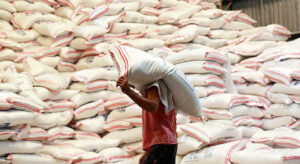THE Bureau of Customs (BoC) said on Thursday that it plans to inspect warehouses holding imported rice for tax compliance and to determine whether inventory levels constitute hoarding.
The BoC will validate the inventories of warehouses storing imported rice, Commissioner Bienvenido Rubio said at a Palace briefing, “and then upon validation, we will then issue letters of authority to conduct inspection on these warehouses.”
The BoC will “validate whether the imported rice paid the correct duties and taxes,” he added.
Recently, the BoC raided three Bulacan warehouses, where it found 202,000 sacks of imported rice valued at P505 million.
The rice stored in Great Harvest Rice Mill Warehouse, San Pedro Warehouse, and FS Rice Mill Warehouse were imported from Vietnam, Cambodia, and Thailand, respectively.
Mr. Rubio said the BoC gave the owners of the warehouse 15 days to submit documents, including proof of tax payment, to demonstrate that the rice was properly imported and released for storage.
“The warehouses were sealed temporarily to secure the imported sacks of rice found therein pending the completion of the inventory by the assigned examiners which will continue today, (Aug. 29), he said.
Should the warehouses fail to submit the documentation, the contents of the facilities may be subject to a warrant of seizure, Mr. Rubio said.
Earlier this month, President Ferdinand R. Marcos, Jr. urged the Trade and Agriculture departments to closely monitor retail prices of rice, while saying supply is sufficient even with prices rising. Some retailers are selling rice at P38 to P40 per kilo “while some are selling their cheapest variety at P50 per kilo,” the Palace said at the time.
The steady increase in the commodity’s prices pushed rice inflation to 4.2% in July, its highest level since 2019.
The Department of Agriculture has recommended that the private sector import an additional 500,000 metric tons (MT) of rice in anticipation of El Niño, which is expected to be “moderate or strong” by the end of 2023 or early 2024, possibly dampening crop production.
Mr. Rubio said Philippine rice imports have been declining this year, with imports in the seven months to July amounting to 2.26 million MT, down 15.63% from a year earlier. — Kyle Aristophere T. Atienza

